|
|
|
Sort Order |
|
|
|
Items / Page
|
|
|
|
|
|
|
| Srl | Item |
| 1 |
ID:
052287
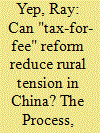

|
|
|
|
|
| Publication |
Mar 2004.
|
| Summary/Abstract |
This article questions the effectiveness and viability of the fiscal response to rural stability adopted by the Chinese state. Tax-for-fee reform (feigaishui) has been heralded as a possible solution to the cancer of excessive fiscal predation by local government. While the experiment may have achieved in relief of peasant burden, the success is simply based on central government financial sponsorship and is thus hardly sustainable as a national programme. And unless there is fundamental reform of fiscal redistribution, the new scheme will ironically hurt rather than help the poorest peasants. Putting all the blame on local cadres is politically expedient, but the central government needs to admit that the present crisis is a result of the systemic discrimination against peasants and the consequent deficit in financing rural governance. The ultimate solution entails a full-scale eradication of structural bias against the peasantry.
|
|
|
|
|
|
|
|
|
|
|
|
|
|
|
|
| 2 |
ID:
123964
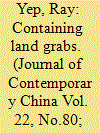

|
|
|
|
|
| Publication |
2013.
|
| Summary/Abstract |
To a certain extent, a more stringent regime for requisition of rural land may help protect the interests of peasants. There is, however, a hierarchy of income opportunity in the countryside as a result of diversification of rural economic structure in reform China. The varying degree of land dependence renders a contrasting calculation on the value of land lease among Chinese peasants. For peasants in the more prosperous regions, the conflicts are primarily triggered by their exclusion from direct engagement in the land market and deprivation of the chance to maximise potential gain that fuels the growing tension in the countryside. A more direct response to this fundamental cause, however, requires audacious moves by the Party leadership venturing into zones of political taboo.
|
|
|
|
|
|
|
|
|
|
|
|
|
|
|
|
| 3 |
ID:
122637
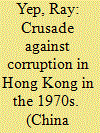

|
|
|
|
|
| Publication |
2013.
|
| Summary/Abstract |
The creation of the Independent Commission Against Corruption (ICAC) in February 1974 was arguably one of the most important developments in Hong Kong since 1945. Not only did major corruption syndicates disappear from the fabric of public administration in the colony, but the popular acceptance of bribery as a component of social life also faded away. Sir Murray MacLehose, who served as Governor of Hong Kong between 1971 and 1982, was regarded by locals as the maverick behind this miracle. This article argues, however, that the genesis of the ICAC could be better understood as a product of the cumulative efforts of MacLehose and his predecessors. The initiative should also be considered in the political context of the rising tension between London and the local community. In a way, the establishment of the ICAC helped pre-empt London's intervention in this matter. Also, despite a public appearance of unbridled support for the crusade against corruption, MacLehose's resolve was severely tested during the early years of the ICAC, and he did contemplate moderating the operation of the Commission, even before the partial amnesty in 1977.
|
|
|
|
|
|
|
|
|
|
|
|
|
|
|
|
| 4 |
ID:
115053
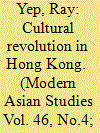

|
|
|
|
|
| Publication |
2012.
|
| Summary/Abstract |
The rule of law has always been cherished as one of the key institutions central to the successful transformation of Hong Kong from 'a barren rock' into a global city. The colonial administration's respect for the principles of the rule of law, however, has been tested by sporadic political turbulence during the 150 years of British rule. Due process of law and other key principles of English laws have been compromised by political expediency when the colonizers felt threatened by challenges from various sources. The 1967 Riots was one of those difficult times. Despite the facade of public support for firmness against disturbances enjoyed by the colonial government, the exercise of some of these emergency powers, particularly the powers to detain and deport, remained highly controversial. With normalization of the Anglo-Chinese relationship in mind, the confrontation prisoners constituted a stumbling block for renewing the friendship with Beijing. The various attempts made by London at pressurizing the Hong Kong government for early release of these prisoners attest to the prevalence of political expediency over the respect for the rule of law under colonial rule.
|
|
|
|
|
|
|
|
|
|
|
|
|
|
|
|
| 5 |
ID:
081530
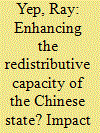

|
|
|
|
|
| Publication |
2008.
|
| Summary/Abstract |
Many observers contend that fiscal deprivation of the centre in reform China is detrimental to the overall capacity of the Chinese state, and thus the danger of national disintegration cannot be discarded. One relevant concern here is the obligation of the state to redress socio-economic dislocations, of which growing regional inequality is a major issue. The Tax Sharing Scheme introduced in 1994 represents the most colossal effort to redress the centre-local imbalance. The analysis of the patterns of income and expenditure of county finance between 1993 and 2002, however, highlights the many facets of state capacity and reiterates the possibility of state involvement amidst an improved fiscal position. The success in extractive capacity in this case does not guarantee parallel improvement in the central government's redistributive capacity. Analysis of local expenditure patterns shows that the growing support of the centre simply fails to reverse the declining level of local services in areas that may be targeted as key for poverty alleviation and equalization. The danger of the simple reading of the rise in extractive capacity attributed to the 1994 reform as a symptom of a strong central state is evident.
|
|
|
|
|
|
|
|
|
|
|
|
|
|
|
|
| 6 |
ID:
085029
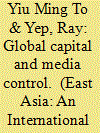

|
|
|
| 7 |
ID:
081524
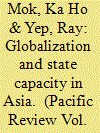

|
|
|
| 8 |
ID:
173853


|
|
|
|
|
| Summary/Abstract |
A seismic change in the residential pattern is emerging in rural China today: traditional rural houses have been rapidly erased from the face of the countryside with large numbers of peasants being relocated to modern high-rise buildings. This process of “peasant elevation” has had a monumental impact on rural China. It redefines the entitlement to land use by the rural citizenry and negotiations for a new regime of property rights concerning land administration, while, most importantly, it undermines the position of the local state in rural China, whose authority is an aggregation of three distinctive elements: coercive power inherent in the state apparatus, control over economic resources, and resonance with local morality. Based on original data collected in Chongqing, Nantong and Dezhou, this paper argues that the comprehensive uprooting of the Chinese peasantry from the land and the resulting complications have caused moral disorientation among the relocated peasants and fragmentation of local authority. The difficulty in establishing community identity in the new setting has further undermined local governance. This may in turn trigger a wave of social and political tensions that may eventually turn out to be a major political challenge to the regime for years to come.
|
|
|
|
|
|
|
|
|
|
|
|
|
|
|
|
| 9 |
ID:
173250
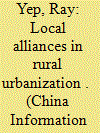

|
|
|
|
|
| Summary/Abstract |
The relocation of peasants to high-rise buildings is the latest strategy deployed to feed the insatiable hunger for land in China. To free up more land for construction, Chinese peasants are encouraged to abandon their traditional homes and move into newly built high-rise modern apartments. A central feature of this distinctive form of rural urbanization is the transferability of land development rights across the rural–urban divide. Like most policy initiatives in Chinese economic reforms, variations and improvisation in implementation are found across local administrations. Such local disparities carry major implications for rural governance. This article compares and evaluates the experience of local governments in Chongqing and Nantong. Local governments in these two localities face both opportunities and constraints in integrated urban–rural development, a situation which has contributed to contrasting relocation patterns, and consequently variations in intergovernmental relationships at local levels. Enjoying the privilege of experimenting with the ‘land bill’ (地票) system, local governments in Chongqing have more leeway to stake their claims and are thus in a better position to maintain their authority. In the Nantong case, however, the more hands-on approach of the prefecture deprives lower administrative levels of flexibility to pursue their interests. This contrast in the policy process leads to different patterns of collaboration between levels of government at the grass roots in the two localities, which may also have a long-term impact on the exercise of authority at the community level.
|
|
|
|
|
|
|
|
|
|
|
|
|
|
|
|
| 10 |
ID:
100995
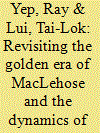

|
|
|
|
|
| Publication |
2010.
|
| Summary/Abstract |
The so-called "MacLehose era" has been fondly remembered as a period marking the turning point in colonial rule in Hong Kong and its socioeconomic development in the postwar decades. This article, however, argues that it was London's initiatives summarized in the document Hong Kong Planning Paper that accounted for the acceleration of social reforms in the 1970s. Contrary to popular perception, MacLehose, who was beholden to local constraints, appeared to be a reluctant reformer. His inclination to defend his vision of the colony's interests brought him into heated exchanges and debates with British officials who were driven by different political calculations and strategic concerns back home. The altercations uncovered in this article reveal that the colony's perimeter for action is certainly defined by the position of the sovereign; yet, the outcome of the process was hardly preordained. Beneath the facade of subservience and accommodation, colonial administrators had stubbornly defended their vision of local interests and tried to implement the reforms at their own pace. They appeared not to be swayed by the asymmetry of power in constitutional terms.
|
|
|
|
|
|
|
|
|
|
|
|
|
|
|
|
| 11 |
ID:
100994
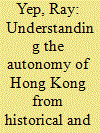

|
|
|
|
|
| Publication |
2010.
|
| Summary/Abstract |
The exercise of autonomy is a product of the political process of mutual learning by the center and the periphery. Propriety of action and response from both sides is not judged simply on the basis of formal legal permissibility, but is also deciphered with reference to experience in previous encounters. Earlier exchanges and responses to interactions create institutional memory, protocols for action, and limits to legitimate expectations. For both the Hong Kong Special Administrative Region and the central people's government, the new framework, through mutual adjustment and adaptation, is still in the process of being made. Their parallel experience in handling the central and local relationship can serve as a good basis for their exchanges. The articles included in this issue provide comparisons in temporal and spatial terms that are crucial for understanding the autonomy of Hong Kong after 1997. These contributions do not simply reconfirm the disposition of local players to defend and assert their interests vis-a-vis the center; the discussion here also identifies factors shaping the manifestation of autonomy in the case of Hong Kong. Trust, reciprocity, agenda of the sovereign power, and resolution of conflict appear to be significant in shaping the outcome of centre-periphery interaction.
|
|
|
|
|
|
|
|
|
|
|
|
|
|
|
|
|
|
|
|
|